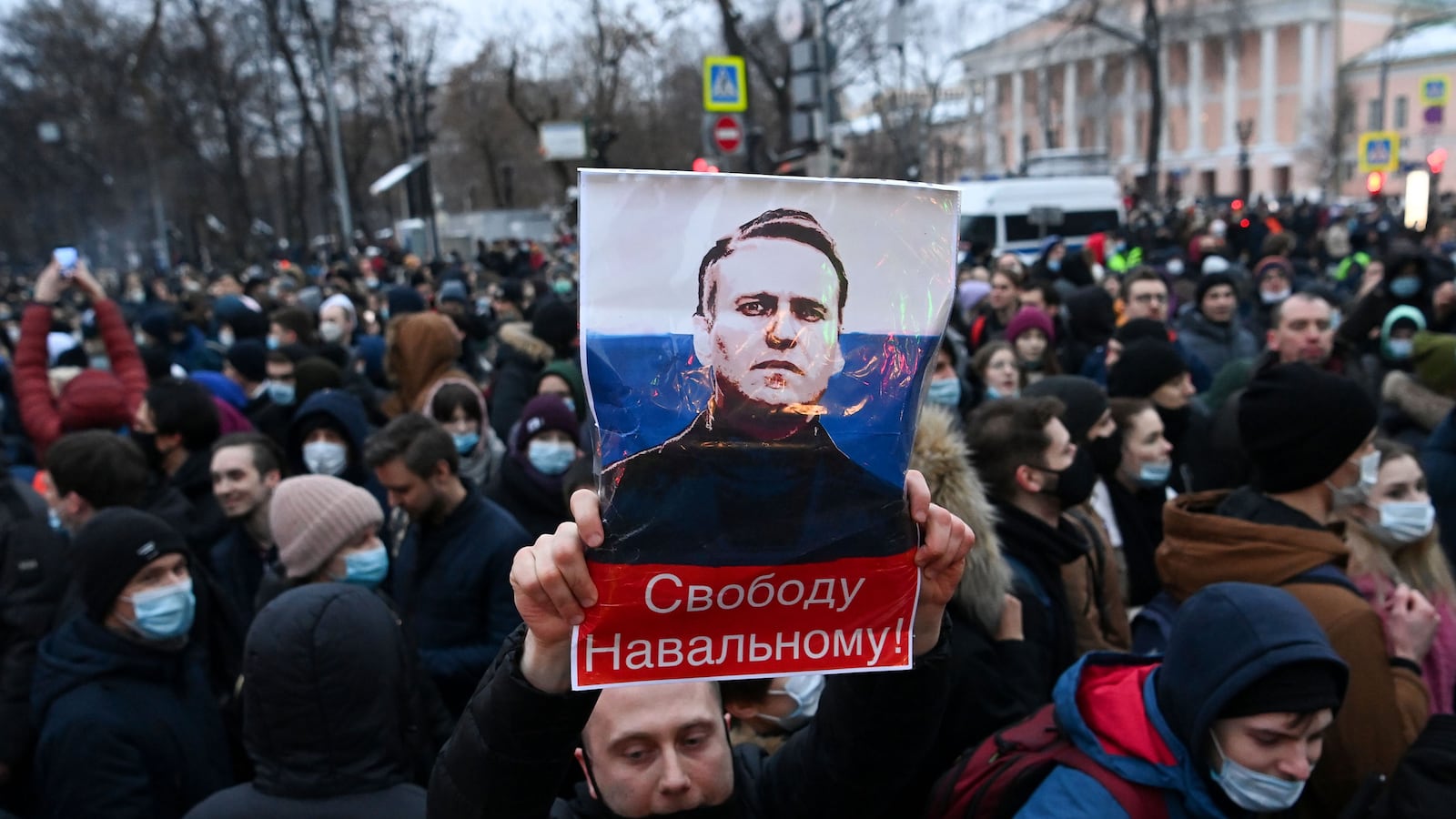MOSCOW— As groups of youth dressed in hip winter clothes arrived in the Chistye Prudy area and began the walk along the pedestrian boulevard toward the central avenue of Tverskaya, it looked by 2 PM as if all pedestrians of the Russian capital were walking in the same direction—to Pushkin Square to join the protest against Alexei Navalny’s arrest.
It turned out to be by far the biggest rally Moscow had seen since the summer of 2019. At least 30,000 people joined the anti-Putin protest in Russia’s capital, as dozens of thousands protested across the country, answering Navalny’s call.
“What are these thieves scared of most of all? Of people coming to the streets,” Navalny said earlier this week, before his improvised court hearing at a police station following his return to Russia after an assassination attempt.
His supporters in major Russian cities responded with demonstrations against corruption and political repressions in central squares across the Far East, Siberia, Ural regions, Far North and central and southern Russian regions.

"People attend a rally in support of jailed opposition leader Alexei Navalny in Saint Petersburg on January 23, 2021."
Olga Maltseva/Getty“Off you go, the Tsar! Free! Free Navalny!” People chanted on the Tsvetnoi Boulevard as buses and trucks delivered riot units in black helmets to Moscow’s city center.
One of the protesters yelled to a group of policemen: “This is our city! We have the majority and you are the minority!” By the time the procession reached the corner with Petrovka, the procession counted thousands of participants.
“I am on the other side, I cannot get through to the Pushkin square, it is absolutely packed with people,” Olga Bychkova, deputy chief editor of Echo of Moscow told a Daily Beast correspondent on the phone from across Tverskaya avenue.
By 3:30 pm, police had detained more than 800 Moscow protesters, including Navalny’s wife and Lyubov Sobol, Navalny’s right hand. Ambulances took bleeding protesters away from the jammed square as police continued to club others.
But as policemen violently clubbed participants near Alexander Pushkin monument and on the Strastnoy Boulevard, Navalny’s supporters did not leave the city center but continued to march around the area.
Pushed away from Pushkin square, thousands of people blocked the streets around it. One group of hurled a police helmet to the ground and threw snowballs at a police mini bus.
A young IT specialist, Svetlana Kostyukova, said it was Navalny’s latest investigation that brought her to the street: “The power did not leave us any choice – we cannot tolerate Putin’s palaces, the outrageous lies, unlawful actions of the authorities.”

"Protesters march in support of jailed opposition leader Alexei Navalny in downtown Moscow on January 23, 2021. The placard reads \"One for all and all for one\". - Navalny, 44, was detained last Sunday upon returning to Moscow after five months in Germany recovering from a near-fatal poisoning with a nerve agent and later jailed for 30 days while awaiting trial for violating a suspended sentence he was handed in 2014. (Photo by Kirill KUDRYAVTSEV / AFP) (Photo by KIRILL KUDRYAVTSEV/AFP via Getty Images)"
KIRILL KUDRYAVTSEVPolice detentions looked brutal. Riot policemen lined up, zoomed through the crowd to grab people on Pushkin Square, one after another, as dozens were dragged onto waiting police busses. Cell phone signals were weak, a high school girl Lena complained to The Daily Beast: “I am trying to call my mother, tell her I am OK,” she said.
Three policemen pushed a protester in a red jacket down to the ground. A few meters away, a young man with a big heart on his jacket and a young woman were holding a banner that listed the names of assassination victims. including Boris Nemtsov and Anna Politkovskaya.
This is a conflict of generations, our country can change over a few days, the Kremlin should realize that and today was a very important day,” a local deputy, Boris Vishnevsky, told The Daily Beast. “We don’t know if authorities would free Navalny now, as a result of this rally. Russians, especially young people, have little choice left: either ignore Navalny’s arrest or join the anti-Putin protest movement, risking to get arrested.”
Russian authorities worked all week to stop young Russians from joining the protest. Officials condemned Navalny, calling him “a CIA agent” and accusing his team of “provoking” young people to illegal actions.
To avoid state fines, social media sites including TikTok and Facebook had deleted many Navalny rally adverts by Friday. But a new trend was growing popular: school kids posted pictures on social media of them replacing portraits of President Vladimir Putin on their classroom walls with portraits of Navalny.
“Our generation is different, we are not going to ignore or forget,” said Karina Basok, a young filmmaker who attended the Moscow protest. “I really hope Navalny would not get a long prison term, I still keep my hopes up.”
By 6 pm, some protesters were hiding from riot police in court yards near the Tsvetnoi Boulevard metro station. Twenty-five-year-old mathematician Mikhail Glukhov was worried his girlfriend had been detained, and said he planned to look for her around Moscow’s police stations.
“This is a real mess, a real political crisis -- a complete failure of the man, whose name we all know,” Glukhov said. “Mass arrests of young professionals, who are Russia’s future, cannot be the solution. We simply want changes. People are exhausted of police arrests, pressure, crooks in power.”

